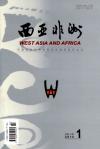
Li Anshan 李安山.
in West Asia and Africa Journal (西亚非洲) No. 1, p. 76-97, 2016.
Reviewed by: Veda Vaidyanathan (Ph.D. Student, University of Mumbai; ICS-HYI Doctoral Fellow)
Professor Li Anshan’s article examines the nature of overseas Chinese immigrants in Africa, the extent of their influence and their relationship with the Chinese state. The bulk of the article dwells on the perceived lack of objectivity among Western scholars in their analysis of Chinese immigrants on the continent. Professor Li also lists out the various categorizations of Chinese immigrants in Africa laid out by scholars from around the world and addresses the various misconceptions surrounding the subject.
To begin with, the author argues that the nature of immigration has changed with time and so there is a need to be careful about the nomenclature used. He states that the term “华侨华人” is often used interchangeably and as one unit which is problematic because, while ‘华侨’ refers to Overseas Chinese, ‘华人’ represents the Ethnic Chinese and they represent two different groups. Earlier, Chinese immigrants were referred to collectively as “中国国际移民” but it would be inaccurate to use that term today given the complex nature of migration flows. For instance, he argues that students who study abroad or employees who work abroad for over a year can be international immigrants but not overseas Chinese, and therefore the same term cannot be used to describe the two. The article tries to examine the different kinds of Chinese migrants in Africa and to determine the influence overseas Chinese have over China’s Africa policy and their impact on the local societies they inhabit.
The most striking aspect of this article is that the author lays a majority of the blame on existing Western academic scholarship, citing ‘fears’ over Chinese overtures in Africa. Professor Li argues against the popular notion that overseas Chinese migrants are merely a means through which the Chinese state expands its influence in Africa. Rather, he asserts that the influx of Chinese migration to Africa is a natural byproduct of globalization, and even a result of China’s own ‘go global’ policy with Chinese entrepreneurs and companies investing in Africa’s untapped markets. He goes on to claim that Western countries, like France, still retain influence over African countries that had once been their former colonies so when they question China’s intentions in Africa, it is hypocritical as they benefited from Africa’s exploitation. The author believes that the fear surrounding increasing Sino-African engagement comes from western countries’ decreasing control or influence over African states. He asserts that China’s development model for Africa is different-especially because China has a “unique political system and surprising economic development.”
According to the author, as western countries encounter more challenges due to China’s increasing influence in the continent, they have begun spreading ‘ridiculous rumors’ to create misunderstandings. He highlights several media reports and books publications (Dianna Games, China in Africa: The New Imperialists, The New Yorker; Peter Hitchens ‘How China has created a slave empire in Africa, The Daily Mail; Howard French, China’s Second Continent: How a Million Migrants Are Building a New Empire in Africa), and a New York Times article in particular that claimed that China was sending prisoners to work in Africa. Such articles and studies were aimed at creating rifts in China-Africa relations and even though academics like Prof. Brautigam have since then proved such claims to be incorrect, these false news stories have already had a negative impact. He also states that western scholars often exaggerate the number of Chinese migrants in Africa and there are more Chinese people living in other countries like the US and UK so the idea of them creating an ‘empire’ in Africa is preposterous. Moreover, most of the Chinese nationals who immigrate to Africa go there to work in companies and almost never take up other citizenships.
Prof. Li presents a very favorable view of the Chinese entrepreneurs in Africa—they contribute constructively to local economies, provide jobs to local people, create new business opportunities- which, he claims, has led Africans to have a strikingly positive view on Chinese immigrants. Although the author is cognizant of the negative impact of Chinese companies for local economies and especially the tensions that exist between Chinese managers and local people, he asserts that since Chinese companies are responsible for large scale job creation, the positive aspects of the relationship outweigh the negative. Given that Sino-African relations have deepened since the 2015 FOCAC summit—various complexities involving Chinese immigrants in African countries notwithstanding—he remains optimistic that the number of Chinese citizens migrating to African countries will only increase in the future.
While the author attempts to provide a balanced perspective on the current debates surrounding Chinese migrants on the African continent, his assessment tends to overlook a multitude of negative outcomes brought about by their economic activities. It is curious that Prof. Li readily attributes critiques of Chinese presence in Africa to a Western bias, this is a problem that deserves further scrutiny. Nonetheless, the article provides a vital perspective from a leading Chinese Africanist, which grows all-the-more valuable as China’s engagement in Africa captures increasing scholarly attention worldwide.
